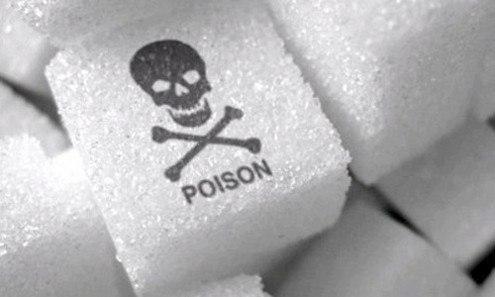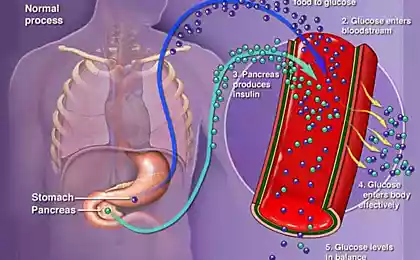938
What threatens the overconsumption of sugar

Sugar - a ticking time bomb. Recommended daily norm Saha has: an average of 24 grams per day for women and 36 grams for men. By the way, for information: in a teaspoon of sugar - about 5 grams
. If you eat sugar regularly chrezmernіh quantities, can lead to? To:
BRAIN. Sugar affect the processes occurring in the brain. Diets with a lot of processed and sugar-rich foods may increase the risk of depression by 58%.
A HEART. Sugar contributes to inflammation of the mucous membrane of the heart arteries, increasing the risk of heart attack.
LEATHER. Sugar adversely affects the skin and favors the mechanisms of aging and wrinkles.
KIDNEY. sugar overload can disrupt the fragile kidney filtration system. One of the main results of the release of her failure - diabetes
. GENITALS. The overabundance of sugar can worsen blood flow, which increases the risk of erectile dysfunction in men and arousal problems in women.
JOINTS. Excessive consumption of sugar increases the level of inflammatory cytokines in the blood that increases the risk of acute arthritis.
Do not forget that carbohydrates - this is not evil, but a necessary nutrient for you: despite what carbohydrates are and how many of them.
And another 70 facts:
1. Causes of immunosuppression. It suppresses the immune system, weakening the body's defense mechanisms against infectious diseases.
2. upsets the balance of minerals in the body and calls the violation mineral metabolism. That can lead to a deficiency of chromium. The main task of chromium - regulate blood sugar
. 3. It is a trace element deficiency of copper in the body
4. Violate the absorption of calcium and magnesium.
5. It is a sharp increase in adrenaline levels, which can lead to irritability, anxiety, attention deficit. In children it is expressed hyperactivity, anxiety, distraction and weakness.
6. It may cause an increase in blood cholesterol levels.
7. Leads to changes in glucose and insulin. It leads to a rise in glucose and insulin levels in women who use hormonal contraceptives.
8. It leads to addiction. Due to unstable blood sugar levels causes fatigue, frequent headaches and fatigue. From this there is a constant desire to eat sweets. Portion of sweet leads to temporary relief, but after a while the feeling of hunger and the need for sweet become even more acute.
9. Sharp can cause hypoglycemia (decrease in blood glucose).
10. Contributes to obesity. As a new chemical compound which is formed during heat treatment a mixture of fat, sugar, and salt (fast food) is not excreted.
11. Contributes to the development of caries. When sugar interaction and bacteria present in the mouth, produced acid, which destroys tooth enamel. But also the sugar solution is sufficiently acidic environment, which is settling on the teeth is capable of destroying tooth. Conduct an experiment - put the lost tooth in a glass of Coca-Cola, and you will clearly see that the sugar - is not harmless to the health of the teeth product
. 12. Promotes the appearance of gum disease such as periodontal disease. A infections in the mouth can cause heart disease. This is due to the immune response of the body to an infection.
13. It is a violation of the sensitivity to insulin, which can lead to diabetes and death.
14. Promotes the development of alcoholism. Yes, and sugar acts like intoxicants, such as alcohol or drugs.
15. Serves as the cause of premature aging, as it accelerates the onset of age-related changes.
16. Is the cause of osteoporosis.
17. Contributes to change (increase or decrease) in systolic blood pressure.
18. It may trigger the appearance of eczema in children.
19. Causes drowsiness and reduced activity in children. Especially after the hyperactive phase.
20. Promotes the early appearance of wrinkles, because it changes the collagen structure and reduces the elasticity of the tissues.
21. May cause pathological change and kidney damage and increase their size.
22. Leads to an increase in the number of free radicals in the body
23. It may disrupt or weaken the structure of DNA, which later can be expressed in mutations.
24. It may have a negative effect on the pancreas through a change in insulin production.
25. Increases the acidity of ingested food.
26. Negatively affect the electrolyte composition of urine.
27. Can contribute to cancer of the stomach, rectum, colon, breast and ovarian cancer. It is related to the development of prostate cancer, pancreas, bile ducts, gall bladder and lungs. Sugar is food for cancer cells.
28. Leads to a malfunction of the immune system.
29. Promotes the growth of bacteria, yeast, and the emergence of fungal diseases. Violation of their balance in the body leads to frequent diseases caused by weakened immunity.
30. Violates the absorption and prevents the absorption of proteins. It can change the structure of the protein and disturb the protein processes in the body.
31. Can cause headache and migraine, including.
32. Reduces the elasticity of blood vessels, which can lead to their damage.
33. It may reduce the elasticity of the tissues and impair their function.
34. May cause emphysema.
35. Provokes the development of atherosclerosis.
36. Serves as cause of food allergy.
37. Can cause appendicitis and provokes exacerbation of chronic appendicitis.
38. adversely affect the functional activity of the enzymes, reducing it.
39. Increases the likelihood of developing varicose veins.
40. May reduce production of growth hormone. Causing a hormonal imbalance that can lead to an increase in estrogen (female hormone) in men.
41. failing eyesight, can cause the development of cataracts and myopia.
42. Serves as the cause of the formation of gallstones.
43. May cause toxemia during pregnancy
44. Violates the metabolic process in the body that contributes to the development of diabetes.
45. Violates the normal intestinal function. May cause gastrointestinal disease stroke and increases the likelihood of ulcerative colitis.
46. Able to lead to the development of arthritis and other autoimmune diseases, such as asthma and multiple sclerosis.
47. Able to trigger Parkinson's disease (tremor and movement disorders).
48. Increases the risk of Alzheimer's disease (senile dementia).
49. It is weakening the body's physiological processes.
50. Reduces the body's ability to fight bacterial infections.
51. Provokes asthma attacks and coughing.
52. Increases the risk of coronary heart disease and predisposes to the appearance of other cardiovascular diseases.
53. Helps to reduce the level of vitamin E.
54. May cause dizziness.
55. A large number of sugar breaks down proteins.
56. Increases the number of fat cells in the liver, causing the liver cells to divide. Which leads to an increase in liver size.
57. It is fluid accumulation in the body.
58. Able to do more brittle tendons.
59. Due to the reduction of attention weakens the ability to learn and remember information.
60. May cause depression and depressed mood.
61. Increases the risk of polio.
62. Increases the concentration of the neurotransmitter serotonin.
63. Violates the process of absorption of nutrients during digestion.
64. Compounding the stress. In times of stress in the body increases the amount of chemicals (stress hormones - epinephrine, cortisol and adrenaline), whose task is to prepare the body to attack or escape. These same hormones can also cause adverse reactions - anxiety, temper, mood swings
. 65. Able to increase the risk of developing gout.
66. Excessive consumption of sugar during pregnancy can provoke the birth of a baby with low birth weight or cause premature labor.
67. Sugar can cause dehydration in infants.
68. Slows the function of the adrenal glands.
69. Excessive consumption of sugar triggers epilepsy.
70. Obese people sugar increases blood pressure.
71. Lowers HDL.
72. Leads to the aggravation of gastric ulcer and duodenal ulcer.
73. Promotes the appearance of hemorrhoids.
Do not eat more than 1 kg of sugar per month (12 kilograms per year). Whereas the average consumption rate in Russia is 80 kilograms. If you think you do not eat so much, you should know that sugar is contained in almost all foods - in the sausage, vodka, ketchup, mayonnaise, and so on.























